In this article:
ToggleThese seventeen social skills games will have your child laughing, learning, and practicing the social skills needed to thrive in life!
Are you looking for the best board games to teach social skills?
Games can teach social skills and give your children ample opportunity to practice them!
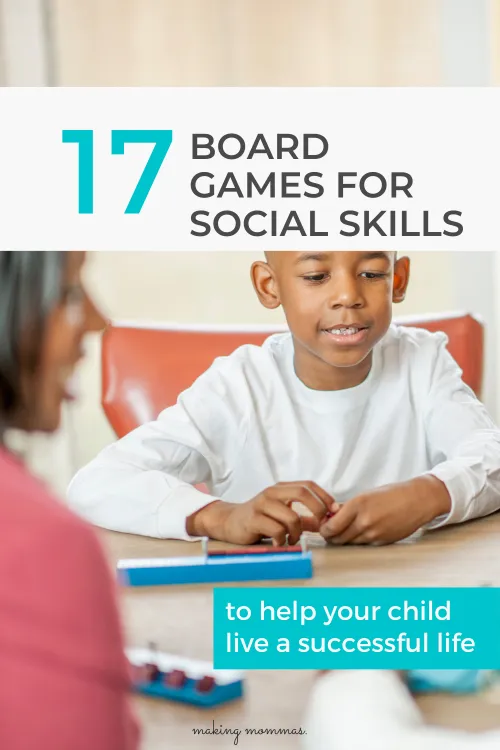
I spent years facilitating social-emotional learning, right alongside psychologists, mental health workers, and a recreational counselor.
We used play to teach social skills. And I was surprised at how many of those social skills games were normal, day-to-day games that all parents can play with their kids.
And I was even more surprised to learn that I played many of them myself, growing up.
So, if mental health workers can use games to teach social skills, you can too, momma!
What social skills should my child learn?
Here is a basic list of social skills that your preschooler should be working on. These social skills will help him fit in at school and thrive later in life.
1. Identifying and expressing emotions
As a toddler, your child may have a hard time communicating his needs, including his emotional state. Heck – he doesn’t even know how he feels, much less why he feels it. 😆
But by the time he is a preschooler, he should be able to identify his feelings. And although he may not be perfect at it, he should be able to express his feelings appropriately.
This involves controlling impulses and acting appropriately in certain situations, such as a classroom setting.
Your child needs to be able to make friends, get along with teachers, and respect authority. He also needs to be able to establish positive relationships.
Managing his emotions is crucial to his success.
2. Accepting no and following the rules
Toddlers have just discovered that they are autonomous – and not just an extension of mom. 😆 So, they are flexing their new-found freedom – by telling you NO! 😂🤣 Constantly.
But as they get older, they need to be able to follow the rules.
Sure, independence and a rebel-like nature are admirable, but not in the classroom. Or the office.
Your child needs to know how to gauge the situation and conform when needed. If he bucks everything, all of the time, then he will not be successful in life. He will not be able to keep a job or thrive in high school.
So, while we still want to encourage autonomism and independence, we also want to teach rule-following.
It’s a fine line, but your child needs to know when to stand up for himself and when to back down if he wants to get along with authority figures, get his needs met, and make friends.
3. Communication and listening skills
Kids cry. A lot. When they are sad, mad, scared, frustrated, and even over-stimulated, they will cry.
This is because they don’t have the words to express how they feel. And oftentimes, even if they do have the words, they can’t put them together fast enough. So, they resort to crying.
But as they start preschool, they should have better communication skills. They should cry less and state what they need more often.
Good communication and listening skills will help your child to develop close relationships, get along with peers and coworkers, and properly get his needs met, all throughout life.
4. Sharing and collaboration
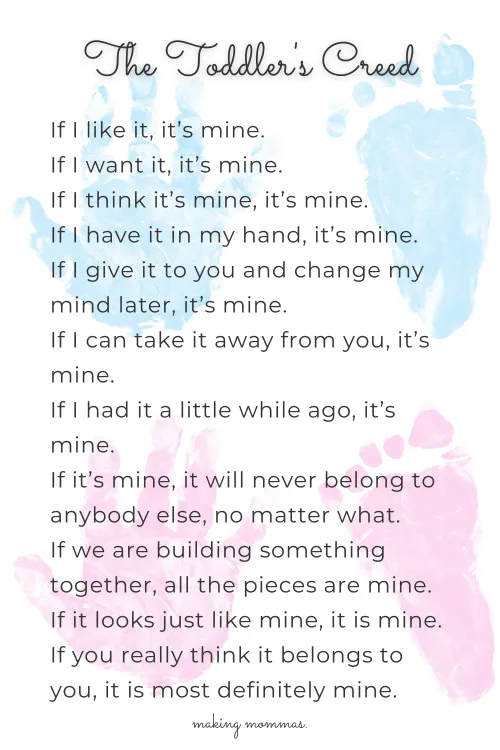
Have you ever heard of the Toddler’s Creed? As toddlers, children have a very hard time sharing, and it’s normal.
But when your child starts preschool, he needs to realize that not everything is his. 🤣😂
He needs to start sharing, not just objects, but also ideas, stories, and work.
When kids work together, they learn to respect each other’s opinions. And they learn conflict-resolution skills.
Your child will need to know how to share and cooperate with others to show appreciation, get along with peers and coworkers, and get his needs met.
5. Patience
In a world of instant gratification, patience really is a virtue! 😂🤣
Your child will need to know how to wait patiently in line, to speak, and wait for his turn…there are so many instances where he will need to have patience throughout his school years and in life.
But more than that, he needs to learn patience and perseverance, when working toward something. Goals aren’t met instantly.
Patience is a must for a thriving, successful life.
6. Good manners and respect
Good manners and respect seem to be a thing of the past. Any schoolteacher will tell you most kids nowadays are totally disrespectful.
But if your child can give respect when the situation demands it, he will have a better chance of getting his needs met, building close relationships, and getting along with others.
Good manners will make him fun to be around. No one likes a poor sport, after all.
How do games help social development?
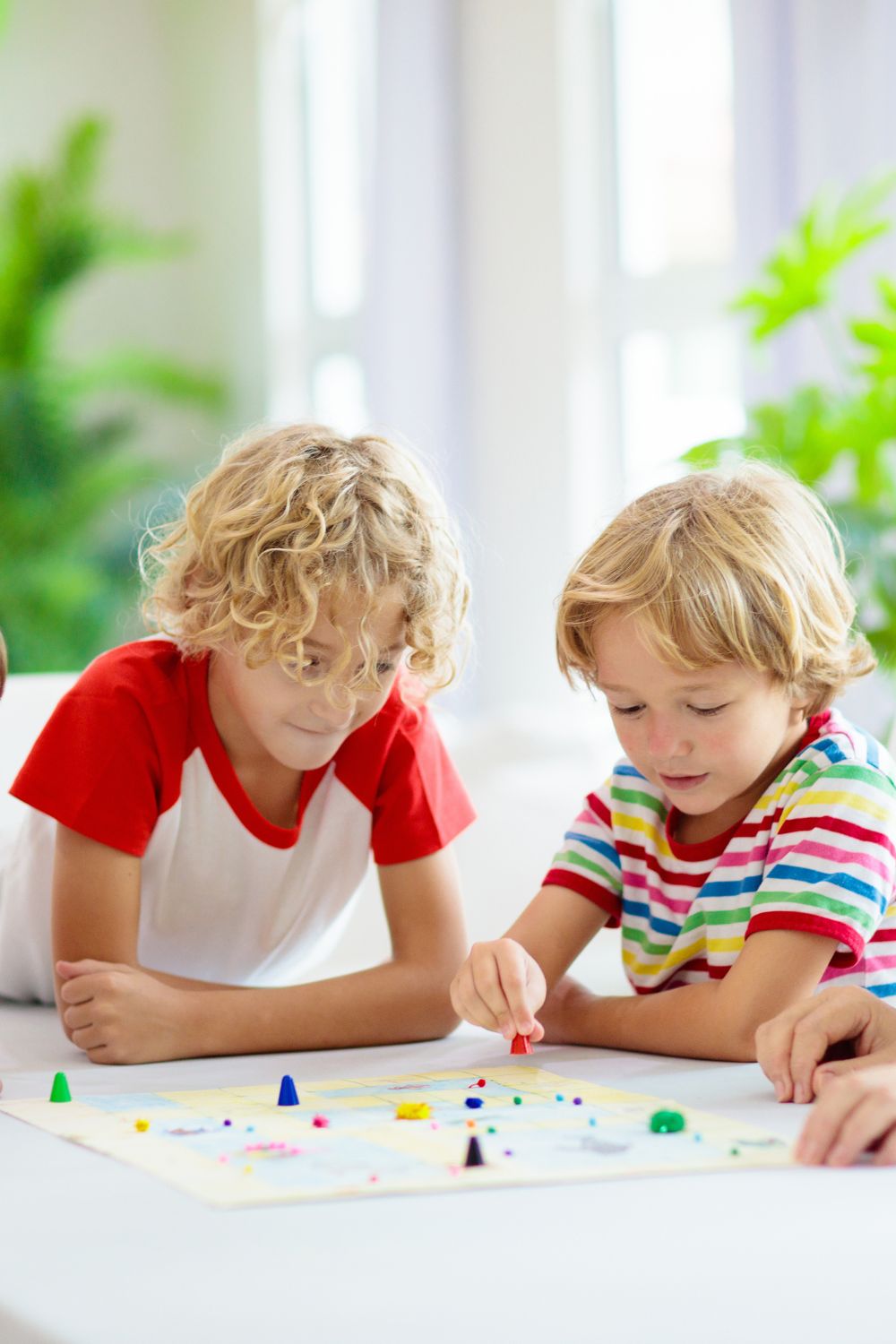
Games teach social-emotional skills, which are the skills we need to connect with other people.
Social-emotional learning helps your child to manage his emotions and build healthy relationships. It helps your child to become more aware of himself, his feelings, and how he affects other people.
But games also help your child develop a few other skills, such as flexible thinking, problem-solving, and the ability to focus on a task. These are also skills that will help your child during social interactions.
Your child needs time to practice any skill he learns, whether it’s math, bouncing a ball, or playing the piano. Board games give kids practice in social skills!
Usually, the only time kids practice social skills is when they are directly in a social situation. And unless your child has siblings close in age, this usually only happens on playdates, at daycare, or in school.
But games set up a “mock” situation in which your child will experience a wide variety of emotions. Kids practice social skills by playing games together, but playing together also gives you the opportunity to teach while playing.
Practicing social skills at home will set your child up for a lifetime of success.
What social skills do board games teach?
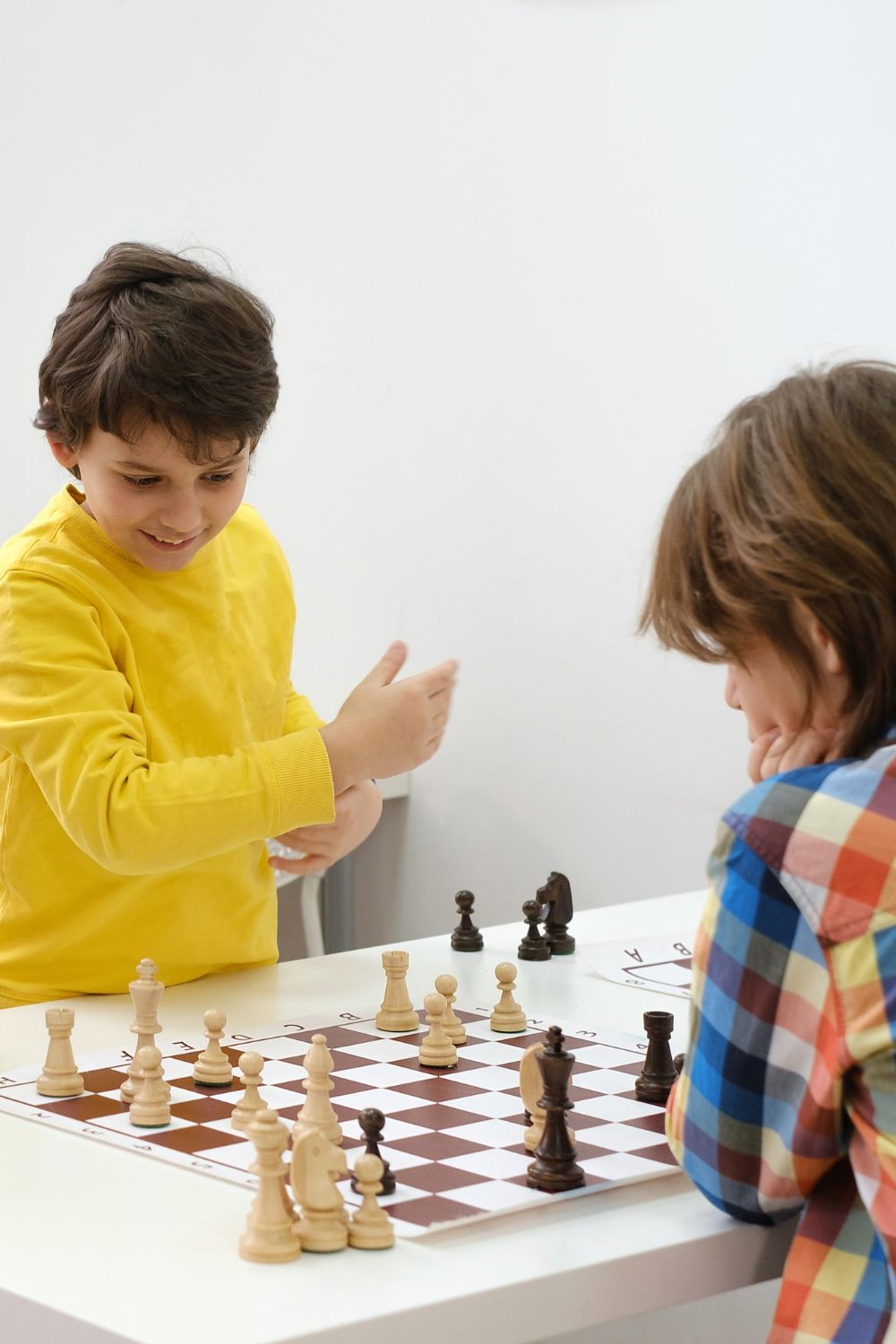
Games teach so many life skills! But these social skills will set your child up for a lifetime of success:
- Following the rules
- Patience and how to sit still
- Taking turns and sharing
- How to handle big emotions, such as anger, frustration, and disappointment
- Honesty
- Life isn’t fair
- How to be a good sport
- Working together and cooperation
- Communication and listening
- How to build relationships and make friends
- Empathy
Playing games helps kids develop all of these skills in a safe, loving environment.
What board games teach social skills?
You don’t need to invest in fancy social skills games to teach social skills. As a social worker, I had many social skills books and social skills games. But they aren’t necessary, are often hard to find, and are costly.
Plus, kids often groan and roll their eyes when you drag out Friendship Bingo. 🤣😂
All you need is good old-fashioned board games. The games you played growing up are perfect!
Here is a list of my favorite games for teaching social skills.
{The following links are affiliate links, which means I earn a small commission if you should purchase a game from this list. Don’t worry, it costs you nothing extra! For more information, read my disclosure policy.}
Note, the prices are subject to change. The price listed is the price at the time of this update.
1. Sorry

Appropriate for 6+
Although Sorry is appropriate for ages six and up, my kids played it much earlier. Of course, it didn’t go exactly as planned, as you saw in the above video. 🤣🤣
The goal of this highly effective social skills game is to get all your Sorry pieces to home before the other players get theirs home. You do this by drawing cards and moving the number on the card. Some cards have special directions, such as “Sorry!”, which is when you get to put another player back at the start.
This game stirs up a lot of crazy emotions in kids! It is great for teaching kids how to handle anger, frustration, disappointment, and even success. It also encourages empathy, as your child starts to truly feel sorry for sending someone back to start.
Cost: $11.99
2. Monopoly

Appropriate for 8+
My kids have been playing Monopoly since they were five. 😂🤣 It is a family favorite.
The goal of Monopoly is to own a monopoly on all the property and force your opponents into bankruptcy. You do this by acquiring property, charging rent, and building hotels.
This is a more advanced game, that teaches strategy, problem-solving, creative thinking, paying attention, perseverance, patience, and of course, how to properly handle emotions. It is also great for math concepts.
Cost: $42.99
3. Apples to Apples, Junior

Appropriate for 9+
Although the box says it’s appropriate for ages nine and up, my kids played as early as six years old.
Apples to Apples is a comparison game, in which the goal is to collect as many green apple cards as you can.
You do this by laying down a card that the “judge” will choose, over everyone else’s card.
Each player has red apple cards in their hand, with a picture and description on each. The players have to choose one of their red apple cards that match as close as possible the green apple card.
The judge then chooses which red apple card he thinks matches his green one the best.
This game teaches more advanced social skills, such as critical thinking, strategy, and perspective-taking, as you try to look at the red apple cards in your hand from the judge’s personal perspective.
Cost: $47.95
4. Operation

Appropriate for 6+
My boys started playing Operation around eight years old. 😂🤣 They could not handle the anticipation before then; this social skills game was scary to them.
In Operation, the goal is to collect as many pieces from the body as you can, by performing surgery. You have to be careful though! Surgery requires a very steady hand.
If you bump the side of the surgical cavity, a buzzer goes off and your turn is over!
Operation teaches how to handle anticipation, patience, tolerance, strategy, and focus.
Cost: $19.99
5. Don’t Wake Daddy

Appropriate for 3+
This fun game is a great introductory game for your preschooler. No reading is required!
The goal is to get to the fridge for a midnight snack before the other players do, without waking up daddy. You do this by drawing cards and moving your piece to the next color, shown on the card.
But be careful! Some cards have pictures on them, and if you don’t hold that matching card, you have to press the alarm! If it beeps, daddy wakes up and springs out of bed!! (And you have to go back to bed…)
This game teaches your preschooler how to handle frustration, anticipation, and disappointment. It also teaches how to take turns, follow the rules, and sit still. 😆
Cost: $42.99
6. Hungry Hungry Hippos

Appropriate for 4+
This game is pretty easy to grasp; my kids were playing at two and three.
The goal is to collect the most marbles by quickly eating them with your hippo.
It’s great for teaching competitiveness, how to handle frustration and disappointment, and that sometimes, if you want something, you just have to fight for it. 😂🤣
Cost: $20.99
7. Candy Land

Appropriate for 4+
This is a great introductory game, as it requires no reading. Your child will practice matching colors instead. My kids were able to play this at two, so give it a shot!
The goal is to get to the Candy Castle before the other players do. You do this by drawing a card and moving your character to the next available color space, matching your card. Be careful though!
Some cards have pictures of candy on them, which means you have to move your character to that matching candy space. This may mean moving way ahead….or way behind.
It’s great for teaching kids the basics of games, such as sitting still, taking turns, and following directions. It’s also good for teaching how to deal with disappointment and for introducing your child to being a good sport.
Cost: $11.99
8. Chutes and Ladders

Appropriate for 4+
You can probably start playing this game with your kids at three. I don’t remember how old my boys were; it wasn’t one we played often.
But it’s a great introductory game! The goal is to be the first to get to the 100th square by drawing cards and moving forward that number of spaces. If you land on a ladder, you get to climb up. If you land on a slide, you have to slide down.
It teaches the basics of game playing, such as taking turns, patience, and dealing with disappointment.
Cost: $12.75
9. Trouble

Appropriate for 5+
Trouble is like Sorry, but it is easier to play. No reading is necessary.
The goal is to get all your pieces home before the other players do. To do this, you “pop” the dice and move your piece the number on the die. If you land on another player, you get to send them back to start.
This game is great for teaching patience because you can’t start unless you pop a 1 or 6. It also teaches how to take turns, sit still, and how to handle disappointment and frustration.
Cost: $11.99
10. Uno

Appropriate for 7+
Uno isn’t a board game, but it’s such an amazing game for social skills, that I had to add it in here anyways!
My kids have been playing Uno since they were four or so, I think.
The goal is to be the first one to go “out” and get rid of all your cards. You do this by matching your card to the discard, either by color, number, or type.
This game teaches how to follow the rules, take turns, pay attention, and how to deal with frustration and disappointment.
Cost: $8.50
11. Guess Who

Appropriate for 6+
Awww man. I haven’t played this game with my little guys yet! Only my older boys. I’ll have to pull it out. 🥰 It was one of my favorites, as a kid.
The goal of this game is to guess your opponent’s character, by asking questions and then eliminating characters based on your opponent’s answers.
It’s great for teaching listening and communication skills, problem-solving, critical thinking, and paying attention.
Cost: $16.99
12. Head Banz

Appropriate for 8+
Headbanz is like Guess Who, except, rather than guessing who your opponent’s character is, you must guess what is on your card.
You play by placing a card in the band on your head. You can see other players’ cards, but not your own. And then you must ask yes or no questions, and try to determine what your card is, based on their answers.
You are racing the clock, so the game is perfect for teaching how to perform under pressure. It also teaches communication and listening skills, problem-solving, and paying attention.
Cost: $17.99
13. Jenga

Appropriate for 6+
My kids played Jenga before six, but it was a bit trickier. They had a hard time following the rule of only using one hand to pull the blocks out.
The goal is to pull a block out and stack it on top of the tower without knocking the tower down. Seems simple enough, but it’s actually pretty tricky!
It’s great for teaching patience, self-control, strategy, and how to handle disappointment, anticipation, anxiety, and frustration.
Cost: $15.99
14. Kids’ Charades

Appropriate for ages 8+
This one is actually a family favorite right now (and the twins are 8). The goal is to get your teammates to guess what you are acting out before the time runs out.
It teaches teamwork, reading body language, creativity, critical thinking, perspective-taking, and working under pressure.
Cost: $22.98
15. Connect Four

Appropriate for ages 6+
My boys were playing this one around three or four years old; just as soon as they could count.
The goal is to get four of your pieces in a row before your opponent does.
It teaches flexible thinking, problem-solving, strategizing, dealing with frustration, and good sportsmanship.
Cost: $11.99
16. Battleship

Appropriate for 7+
I’d say this one is pretty accurate, as far as age goes. My boys did play it earlier, but Ali had trouble understanding how the coordinates worked, and then there were accusations of cheating… 😅
They play really well now!
The goal is to sink all of your opponent’s ships before he sinks yours. You do this by strategically hiding yours, and then calling out plot coordinates to “find” his.
It teaches attention to detail, communication and listening skills, and strategic thinking.
Cost: $16.99
17. Checkers

Appropriate for ages 6+
I think my boys were playing this one around five or six as well. The goal is to capture your opponent’s pieces by jumping over them. Whoever loses all his pieces first loses the game.
It teaches patience, paying attention, dealing with frustration, critical thinking, problem-solving, and strategy.
Cost: $9.99
At the end of the day…
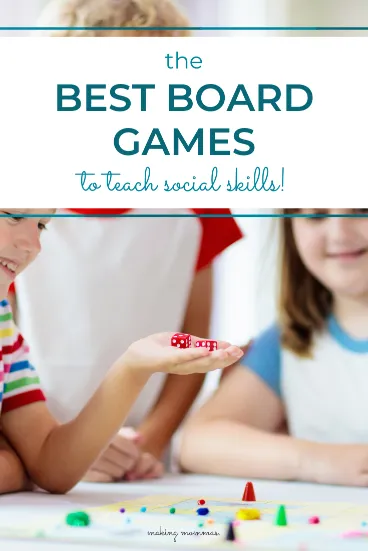
At the end of the day, momma, you really don’t need fancy social skills games for social-emotional learning. 😂🤣. Pretty much any game will teach social skills.
What matters is that you spend that time together, playing and practicing.
As a toddler or preschooler, the most important skill for your child to learn (in my humble opinion) is how to identify emotions and properly express them. And games are great for teaching that.
Not only that but playing together builds that parent-child bond, which is the key to all things parenting!
And that is what your child needs, to be an amazing, successful adult. So, go play!
Here are more toys we like!
The Best Toys for Boys: Ideas to Easily Strengthen Your Relationship With Your Son
The Best Summer Toys for Fun, Quality Time With Your Kiddos
The Best Kid’s Books to Teach Your Preschooler About Money
The Sahm Toy Guide: 31 Surprising Toys to Help You Crush it as a Sahm!
